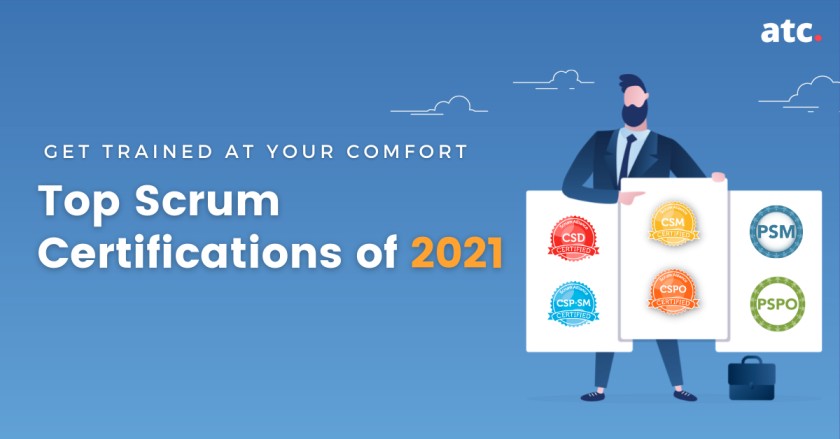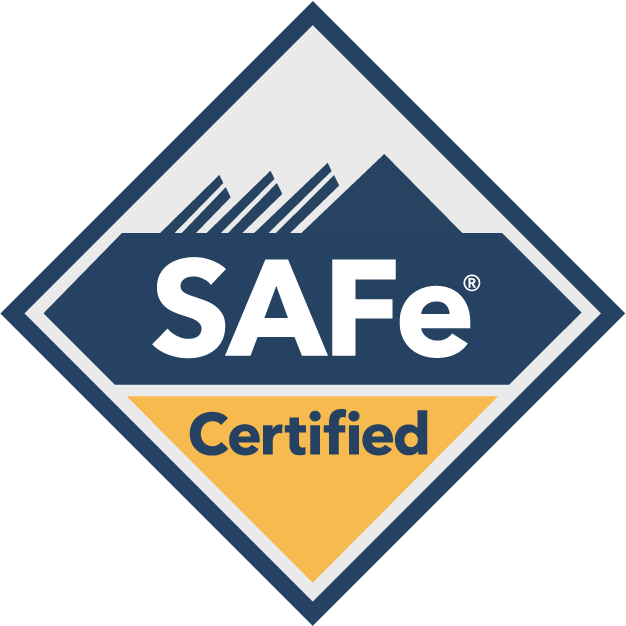Subscribe to the blog
2020 was the year that started the fad of upskilling oneself in a highly volatile economy where no one was indispensable. Within a year, we’ve witnessed almost every individual serious about career growth increasing their expertise in their respective fields. Scrum Master Certification was one of the most requested certifications of 2020.
A Scrum Master is a trained professional who helps organize and scale teams of any size to use the Scrum Methodology. Being certified not only adds credibility but also raises the demand for scrum masters, and their earning potential increases.
In recent years, the job of a scrum master has grown in popularity and demand. With Agile technique driving the corporate sector today, it's no wonder that the role of a scrum master is listed as one of the highest-paying occupations on Glassdoor.
Scrum master was featured on LinkedIn's list of the ‘most promising professions in 2019’ because the majority of businesses have adopted the Scrum Agile methodology to promote speed, collaboration, and communication in complex projects. Scrum masters have become increasingly important as Agile and scrum have grown in popularity.
If you want to thrive in the Agile industry, a Scrum master certification will help you impress hiring managers and offer you a distinct advantage over hundreds of other applicants vying for the same position in 2021. Professionals learn scrum to streamline their risk management abilities and complete projects on time.
What is Scrum Master Certification?
Scrum master certification is an increasingly popular project management framework that helps companies and organizations manage large projects, increase team accountability, and reduce costs. According to Indeed.com, an American job search website, the certified ScrumMaster was in higher demand than ever. Employers are now constantly on the lookout to hire certified scrum professionals, a fact validated by Indeed.com’s survey.
The Scrum Master Certification Cost starts from $775 and can go up to $1995, depending on the specific certification.
The American massive open online course provider Coursera has narrowed down the scrum certifications mentioned in job postings across LinkedIn, Indeed, and Simply Hired. Here are the results:
| Certification | Indeed | Simply Hired | Total | |
| CSM | 3011 | 1667 | 1207 | 5885 |
| CSPO | 1258 | 825 | 547 | 2630 |
| PSM | 519 | 183 | 141 | 843 |
| CSP | 420 | 204 | 158 | 782 |
| SSM | 277 | 201 | 111 | 589 |
| PSPO | 326 | 104 | 90 | 520 |
| CSD | 70 | 60 | 31 | 161 |
Scrum Master Certifications
This is a list of top-paying scrum certifications that will allow you to boost your career and take advantage of this hiring demand in 2020-2021.
- Certified ScrumMaster (CSM)
The Certified Scrum Master (CSM) certification is governed by the Scrum Alliance, the first organization to offer a scrum certification. It's an entry-level scrum accreditation for existing and aspiring scrum team leaders across industries. In the Indeed.com survey, CSM was the 9th most requested certification. With an average salary of approximately $120K per annum and a 24% expected job growth rate in the next 3 years, CSM is indeed the gold standard for scrum certifications.
Benefits of CSM:
- Proficiency in executing scrum
- Create a highly motivated and high-performing team
- Explore newer opportunities
- Earn high salaries. Average salary: USD 118,353
- Entitled to a 2-year membership with Scrum Alliance
People who should take up CSM certification include Software Engineers, Product Managers, Project Managers, Team Leaders, Business Analysts, Product Managers, and Software Developers.
- Certified Scrum Product Owner (CSPO)
The Scrum Alliance now offers the Certified Scrum Product Owner (CSPO) certification, which verifies your product owner training and knowledge. According to detailed research by the World Economic Forum, product owners are among the top nine emerging positions in product creation in 2020. In the CSPO, you'll study the fundamentals of scrum as well as product-specific training, such as how to balance multiple stakeholders' needs and develop a product vision. The CSPO is recommended for Product Owners, Project Managers, Business Analysts, and Data Analysts. As a product owner, you can go on to become an Advanced Certified Scrum Product Owner (ACSPO) or Certified Scrum Professional Product Owner (CSP-PO).
CSPO Demand:
Product Owners have been recognized for their invaluable contributions to scrum teams and their ability to function as a link between development and business. Recruiters recognize the Product Owner's function as an intermediary who maximizes value and inspires teams, as 90 percent of the current teams use scrum for product development. As a result, the demand for product owners continues to grow, with hundreds of new product owner positions being added every day.
- Improve your Agile expertise
- Maximize value and improve stakeholder satisfaction
- Expand your network and speak a global product owner language
- Earn a two-year membership with Scrum Alliance
People who should take up CSPO certification include Project Managers, Developers, Product Owners, Managers-Software development, Architects-Software development, Product Managers, Software Developers, Software Testers, Team Leads, and associating team members interested in learning scrum.
- Professional Scrum Master (PSM I)
Scrum.org, an organization created by Ken Schwaber, one of the co-creators of Scrum Alliance, offers the Professional Scrum Master I (PSM I) credential. This credential, with its high standards of training and exhaustive assessment, ensures that holders have mastery over the Scrum framework. The PSM I certifies your knowledge of the Scrum framework and how to use it. The PSM I is the first level of scrum certification offered by Scrum.org. You can go on to take the PSM II or PSM III, which will test you on more complex scrum processes.
PSM Demand:
According to Scrum.org's 2019 Scrum Master trends, PSM I was one of the top three qualifications among survey respondents.
Scrum is by far the most popular agile framework, and its popularity is unlikely to wane anytime soon. PSM I is both financially rewarding and career-defining.
Benefits of PSM:
- Lead a team of scrum experts who deliver scrum advantages to projects.
- Assume the role of a servant leader, resolving disputes and overcoming difficulties to provide the best after each sprint.
- Overcome corporate obstacles for effective scrum implementation.
- Earn high wages; on average, up to USD 93,570 per year.
- Demonstrate a high degree of scrum competence.
People who should take up PSM certification include Project Managers, Scrum Masters, Developers, Product Owners, Software Development Managers, Software Architects, Product Managers, Software Developers, Team Leads/Team Members, etc.
- Certified Scrum Professional (CSP)
The Certified Scrum Professional (CSP) is the Scrum Alliance's highest-level credential in the product development track. The CSP is unique to developers and is designed to help you become a professional who improves how Scrum and Agile principles are implemented on your team. It differs from the CSP-PO and CSP-SM, i.e., it is designed to help you become a professional who improves how Scrum and Agile principles are implemented on your team.
You may begin your journey toward becoming a CSP by first becoming a Certified Scrum Developer (CSD).
Requirements: You must have an active CSD certification, thirty-six months of Agile or scrum work experience in the previous five years, and seventy Scrum Education Units in the last three years to be CSP certified. You’ll then complete an application, which will have to be approved.
Benefits of CSP:
- Develop extra tools and abilities that help you work more successfully and confidently with people outside the scrum team.
- Advance your career and stand out in the job market.
- Unlock the opportunity to advance to Guide-level accreditations, such as Certified Team Coach.
ScrumMasters, Iteration Managers, Agile Coaches, and Delivery Managers with a good grasp of scrum and significant experience working with a development team and product owners are the ideal candidates for CSP. It's not for those who aren't familiar with scrum or Agile.
- SAFe Scrum Master (SSM)
If you want to work as a Scrum master in a company that uses Agile, Lean, or DevOps ideas on a big scale, being SAFe Scrum Master (SSM) certified might be the answer. The SAFe Scrum Master certification verifies that a person can handle scrum master duties in a scaled Agile context. Individuals who are SSM certified can manage Agile Scrum transformations, build high-performing teams, and guarantee that scrum techniques are implemented throughout the business.
The certification is administered by Scaled Agile, the organization that oversees the Scaled Agile Framework (SAFe). In addition to getting acquainted with scrum, you’ll learn the tools you need to work with fully remote teams.
Requirements: You’ll have to take a required two-day course approved by Scaled Agile, in addition to passing an exam.
SSM Demand:
According to the 13th State of Agile Survey Report (2019), the Scaled Agile Framework is the most popular scaling method. The demand for SAFe certified experts has risen dramatically as more businesses realize the benefits of scaling agile and using its potential on an enterprise-wide scale.
Benefits of SSM:
- Perform the responsibilities of a servant leader
- Successfully carry out Program Increment Planning
- Facilitate Iteration Execution
- Manage the Program Increment
- Coach an Agile team that is highly motivated and performs well
- Get the Certified SAFe Scrum Master Certificate (PDF format)
- Get the Certified SAFe Scrum Master Digital Badge
- One-year membership to the SAFe Community Platform
- Access to SAFe events and MeetUp Groups
- Get access to various SAFe learning resources
- Open yourself to lucrative opportunities and high salaries—as high as $80,000 to $1,10,000 annually
SSM is best suited for:
- Program or Project Manager
- Consultant
- Architect
- Engineer
- Scrum Master
- Team Lead
- Release Train Engineer
- Business Analyst
- Agile Coach
- Portfolio Manager
- Developer
- Director
- Quality Manager
- Product Manager
- Product Owner
- Delivery Manager
- Program Manager
- Professional Scrum Product Owner I (PSPO I)
Scrum.org's Professional Scrum Product Owner I (PSPO) certification verifies your ability to optimize the value of a development team's product. The certification assesses your knowledge of Scrum.org's Product Owner Learning Path, as well as your ability to apply and interpret the Scrum Guide. If you want to advance your credentials, you can go on to get the PSPO II and PSPO III from Scrum.org.
Requirements: Clearing the PSPO I exam is required to earn the credential. A course is not required but highly recommended.
Candidates who complete the PSPO course will be able to work effectively with stakeholders and customers to understand their requirements and needs. As a result of PSPO training, individuals become experts in product management and act as the backbone for project management in a variety of companies. The Professional Scrum Product Owner certification may be interesting to all those involved in product development using the Scrum framework.
- Certified Scrum Developer (CSD)
The Certified Scrum Developer (CSD) program from the Scrum Alliance is for product developers who work in scrum settings. You'll gain familiarity with the basic ideas of scrum and Agile in the context of product development as part of the training necessary to become a CSD. The CSD is a prerequisite for both Advanced Certified Scrum Developer (ACSD) and Certified Scrum Professional (CSP). The Professional Scrum Developer (PSD) is a similar offering by Scrum.org.
Requirements: Becoming a CSD requires you to take a Scrum Alliance-approved CSD course of at least two days.
Benefits of CSD:
- Highlights your capabilities to improve a project’s quality
- Helps you make your organization Agile-oriented
- Changes your mindset
- Helps you stay relevant and marketable
- Helps you perform better with a team
LinkedIn’s “Most promising jobs of 2017” states that job openings for Scrum Masters grew 104 percent year-over-year from 2016, with a career advancement score of 8 out of 10, and Scrum Master was seen on the top 10 emerging Product Development jobs list published by the World Economic Forum. Not only is the number of positions increasing, but so is the base income received by Scrum-certified experts, which rises in line with the number of certifications acquired. As a result, the more credentials you have on your CV, the better your income will be. Thousands of job vacancies for scrum professionals have existed since the start of 2021. Make yourself and your company more valuable by earning one or more of these high-paying scrum certifications.
ATC partners with entrepreneurs and businesses to build products that solve everyday problems through the creative use of technology. Scrum certifications are a part of our ecosystem’s training programs. We nurture client efficiency not only through the custom products we build for their organizations but also by the automation opportunities we identify through expert business analysis.
Visit our website American Technology Consulting for more information.




